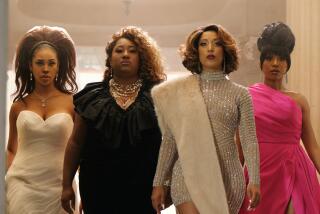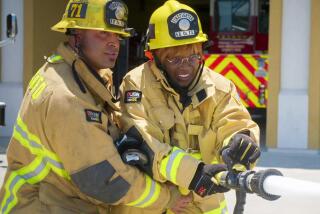NEWS ANALYSIS : A Week of Murphy’s Law Plagues Bush : Media: From TV sitcom focus to debate controversy, anything that can go wrong does for the President.
- Share via
WASHINGTON — The senior Republican campaign strategist was blunt--and not happy. “We can’t win this now,” he said of the race for President, “but (Bill) Clinton can still lose it.”
If that is true, George Bush had a bad week.
In the war of media images and messages over the last seven days, Clinton, the Democratic presidential nominee, was not losing. Bush was.
Clinton may not have masterfully controlled the airways. CBS even accused him of coasting on his lead--”Tastes great, less filling,” CBS’ Susan Spencer said of his campaign.
But this was the week when the President launched a major strategic push attacking Clinton directly and harshly. On network television, Bush’s strategy didn’t play.
Much of the week on the airwaves was spent instead on the television sitcom “Murphy Brown,” questions about Bush’s own credibility and the President’s refusal to debate Clinton under a format proposed by a bipartisan commission.
Privately, Bush aides now acknowledge that the controversy over debates seems to have hurt him in the two possibly crucial states where the canceled events were to be held--Michigan and Kentucky (together, they account for 26 electoral votes).
The week began badly for the President. On Monday, Bush appeared on conservative Rush Limbaugh’s radio program and accused Clinton of calling the military “immoral” in a 1969 letter. NBC’s John Cochran and ABC’s Brit Hume pointed out that the letter did not say that. But when the White House was confronted with that fact, it refused to retract the statement.
Given that Bush was trying to attack Clinton’s credibility on the issue of his avoidance of the Vietnam-era military draft, leveling a false accusation did not help the President.
The day before, the New York Times also contributed to blunting the effectiveness of the draft issue by reporting that Vice President Dan Quayle almost assuredly benefited from special treatment in landing a spot in the Indiana National Guard that allowed him to avoid the draft.
The continuing GOP bid to use the draft issue “appeared to backfire when Quayle acknowledged he had joined the National Guard to avoid the war,” NBC’s story on the “Today” show Monday reported.
The Bush campaign viewed Tuesday as a key moment for him on the campaign trail. The President staged an elaborate attack against Clinton in each of the six states surrounding the Democrat’s home state of Arkansas, a hexagonal multistate photo opportunity. The event laid the groundwork for the campaign to release an ad in 11 states the next day echoing some of the President’s criticisms of his rival.
But while the Bush trip earned coverage from local media and the nation’s major newspapers, the three broadcast networks mentioned it only in passing.
They focused instead on replaying portions of the “Murphy Brown” show that had aired Monday night, a program ABC correspondent Jeff Greenfield called a “dead-earnest, frontal assault” against Quayle for claiming earlier this year that the show inappropriately glorified single mothers. CBS had talked the night before about how, worried about “Murphy Brown,” the Republicans were now backing away from their family values theme.
Throughout the week, all of the major media talked and wrote about how Bush was avoiding debates. Clinton won the trifecta of political campaigns: Each of the three broadcast networks replayed a clip of him in Michigan, saying: “Why didn’t he show up? I guess I can’t blame him. If I had the worst record in 50 years, I wouldn’t want to debate, either.”
Bush campaign officials and Clinton advisers agree that Bush, who polls once showed as being tied with Clinton in Michigan, now has fallen behind. They partly blame the negative fallout from the debate flap.
The same may be beginning to happen in Kentucky, a Bush aide acknowledged.
By Wednesday and Thursday, Bush was engulfed in two other controversies that, like the draft attack earlier in the week, had raised “a question of credibility,” about him--”the very issue that the President wants to attack Clinton on,” ABC’s Hume said.
One issue is whether Bush has fully acknowledged how much he knew about the Iran-Contra scandal while he was vice president during the Ronald Reagan Administration. Retired Maj. Gen. Richard V. Secord--a key figure in the Iran-Contra affair who is now promoting a book he wrote on the scandal--is alleging that Bush played a much larger role than he has admitted in the arms-for-hostages deal. Most major newspapers, ABC’s “World News Tonight” and “Nightline,” the “CBS Evening News” and the “NBC Nightly News” all did stories on the subject Thursday.
“There is new evidence that Bush is lying,” NBC’s Tom Brokaw said.
The other issue was whether Bush has been truthful about his role in helping America’s enemy in the Persian Gulf War--Iraq--build a nuclear weapons program before the conflict began. CBS on Wednesday night--and the Los Angeles Times in its Thursday editions--did stories about new state Department memos that contradicted Bush’s explanation on that subject.
More to Read
Get the L.A. Times Politics newsletter
Deeply reported insights into legislation, politics and policy from Sacramento, Washington and beyond. In your inbox twice per week.
You may occasionally receive promotional content from the Los Angeles Times.










